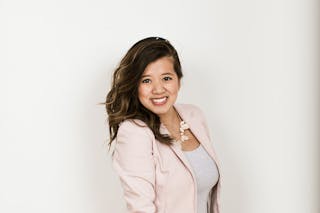By Katie Johnson ’19, content specialist
July 09, 2020 | Noon

Associate Dean of Career Development and Calling Ann Vu Ngo loves working with students and alumni to help them figure out who they've been created to be.
“Two roads diverged in a wood, and I— / I took the one less traveled by, / And that has made all the difference.”
Some people interpret Robert Frost’s “The Road Not Taken” to be a call to accomplish hard things, to stay on the straight and narrow lest they face judgment for their actions. However, upon a closer look, readers understand that the road less traveled by may mean that the narrator could choose what he wanted for his life, regardless of society’s expectations for him.
Associate Dean of Career Development and Calling Ann Vu Ngo is somewhat of a modern-day Robert Frost. She roots for Bethel students and alumni to forge their own paths rather than feel trapped in their high school expectations or even their major at Bethel. She meets with students to help them figure out both how to write a resume and what job fits their natures. She presents in undergraduate and graduate courses and partners with various departments to best serve students as they determine their own career paths and callings. She even researches the current economic climate, especially since it has changed so quickly with the pandemic.
In this Q&A, Vu Ngo reflects on her personal journey and offers advice for those still looking for their own callings in this ever-changing world.
What brought you to Bethel?
I actually started off in the Masters of Counseling Psychology program at Bethel. In my practicum year, I became the intern for the Office of Career Development and Calling. It was totally a God thing, because they had an opening in the office, and my supervisor asked if I would be willing to increase my hours to help out. I said, ‘Make me the counselor. I’ll do everything that she did. Just throw me in there.’ I was just really excited to work, to learn, to do everything. I made a space for myself that internship year. I shadowed every counselor and soaked up as much as I could, and then I took on clients. I presented every chance I got. And I’ve been there ever since. I’ve just been able to grow, find my little space here, and continue to spread my wings.
What do you love most about the Bethel community?
I’ve always been really passionate about working with the students. I’m a career counselor, but I’m always going to talk to students about life and whatever’s on their minds. I really get to witness all the ebbs and flows of self-identity and academic development—and then the launch. That gets to be a huge joy for me.
Every colleague of mine is excited about the students too. Even if we don’t all do the same thing, everyone has a different role in this student’s experience. I always tell students: “You’re the coach, and we’re all players here. You put us into your game. You can put us in that field.” That’s something that my colleagues and I unite under.
What was it about Career Development and Calling that you found a home in this department?
It’s so aspirational. I always liked working in education, because it always felt like the land of opportunity. I thought with my immigrant upbringing that education was going to be the vehicle to my success, and that wasn’t a privilege anyone before me had. Everyone who is in school is becoming someone that they want to be. And I get to coach people towards that.
Career Development and Calling is really unique because I get to hear students' hopes and dreams. I get to see them fail trying to get them. I also get to see them get it. It’s 100% aspirational and developmental, and I eat that stuff for breakfast, lunch, and dinner.
— Ann Vu Ngo, associate dean of Career Development and CallingWhat is the vision of Career Development and Calling?
The vision of Career Development and Calling is to complement students’ academic learning with the skills and confidence to achieve success—whatever success means to them. For students to become great world changers when graduating from Bethel, they need a space to learn what being true to themselves is. Then we teach them the skills to find work and apply their knowledge in ways that honor their gifts. We are resourceful with strategies and tangible applications to empower students to get what they need. Does that mean that it won’t be hard when they graduate? No. It’s a tough transition regardless. But what we can say is that if they need someone to work with through that tough season, they can meet with us, and we will help them. We want students to graduate and be resilient—able to fish, if you will. They have to catch their own job, and repeat that process whenever necessary, whether it’s right out of college or if it’s five years down the road.
How do you know what you’re doing right now is your calling?
One of the things that confirms that this is a calling of mine is that there’s this continuity between who I am now and who I’ve always been showing up in my work. One of the questions I love to ask people is: “What did you do in your free time as a kid?” As children, we were showing up in the world naturally, before the world asked anything of us. Our inner us wants to match that little kid. What were we doing then? Because that’s likely how we want to be at work as well.
I was always so quiet in classrooms. But I would spend recess sitting at the sandbox, life-talking with my friends. Now, I don’t know what first graders life-talk about, but we were doing it. My teacher would walk up and say, ‘Oh my gosh, you’re talking so much! Why don’t you go play though?’ Confused, I looked up and said, ‘I am playing. What do you mean?’ And when someone sits down in an appointment, I’m playing because I get to bring everything that I am and all the gifts I have to offer in that session. That’s how I know this is a calling. God really shows up to those spaces.
Now, I really want to add, when I work with students, I say, “I didn’t graduate and get my calling.” I think that is a huge thing to understand. It’s not a fully packaged thing that you approach at the end of your ride. It’s something that you slowly uncover with every trial and error and hope. Some professionals may be doing what they set out to do at the start of college, and some wore many hats and will continue to!
I think that’s what people miss when they think, “I have to get something within my major.” Says who? There are never accidents going forward. When we plan, we want everything to be right on the money, most convenient, and most direct. If we look back, we know life never works that way. As long as we stay true to who we are, we won’t feel like we missed a beat of that drum by any job we have. We need to give ourselves permission to not have our jobs match our majors, and at the same time, our experience was not a waste of our four years. We are all the only person we need that permission from.
We're here to serve Bethel students and alumni in their career development. Take a look at how we can support you—from exploring strategies for a successful job search, to holding practice interviews, to offering career assessments. One of the best places to start is talking with a career specialist. They'll get you pointed in the right direction.

Read the current issue.